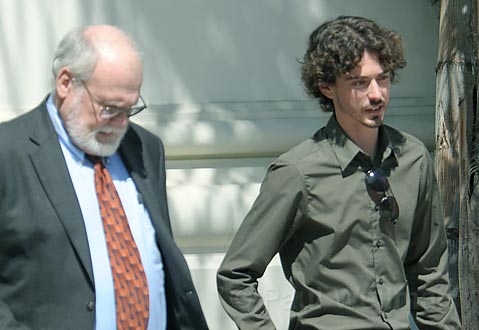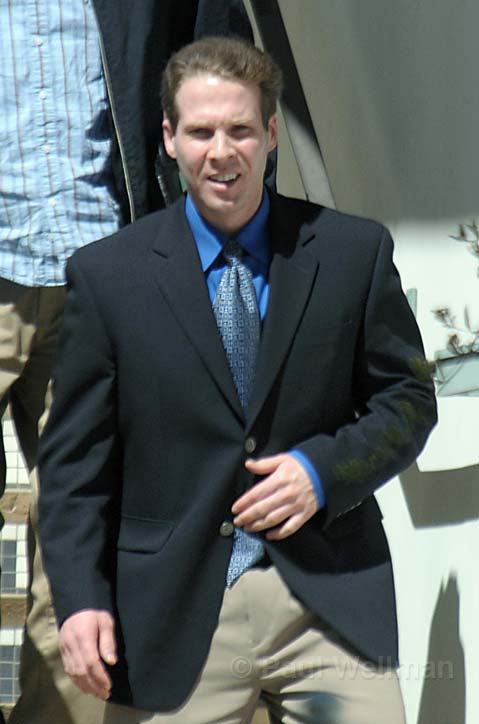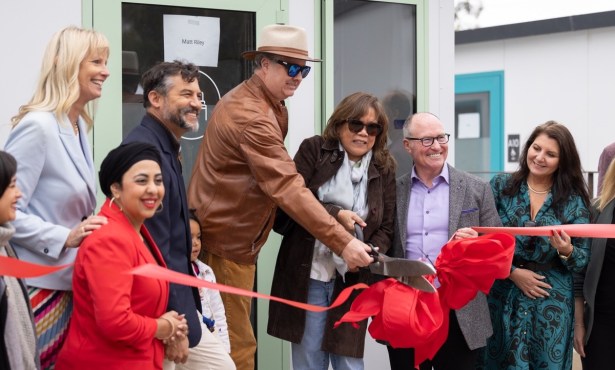Graham Pressley Testimony Continues
Accomplice to Nicholas Markowitz Murder, Who Already Served His Time, Describes Jesse James Hollywood's Involvement

It’s been Graham Pressley week in the murder trial of Jesse James Hollywood, and it’s not over yet – the witness, who was a minor when he assisted in the killing of 15-year-old Nicholas Markowitz in 2000, and has already served his time, will return to the stand on Monday morning. At the time of the crime, Pressley was a 17-year-old occasional marijuana dealer who partied with Markowitz in the days leading up to his death. Pressley eventually directed gunman Ryan Hoyt to the Lizard’s Mouth hiking area, where he participated in digging the grave where they would hide Markowitz’s body. His testimony is being used by the prosecution to link Hollywood to the crime.
On Wednesday, June 3, the defense had a difficult time discrediting his testimony. Pressley, who was sentenced as a minor for his involvement and released from a correctional facility in 2007, was wide-eyed, soft-spoken, and calm on the stand, describing his actions as selfish and cowardly. But he turned out to be a formidable opponent to the Jesse James Hollywood defense team, who grew increasingly frustrated with the witness’s composure during his cross-examination. Hollywood was not present for the murder of Markowitz, but the prosecution’s theory is that he masterminded Markowitz’s kidnapping and murder over a drug debt owed by Markowitz’s half-brother, Ben. If found guilty, Hollywood faces the death penalty. Pressley is one of many witnesses who may have indirectly taken Hollywood’s orders without even realizing it.
When Pressley met Markowitz at his friend Jesse Rugge’s Santa Barbara home on August 6, 2000, nothing seemed unusual. Rugge introduced Markowitz as “a friend from L.A.,” and he was not bound or tied up in any way. After hanging out with Rugge’s friends and smoking marijuana, the victim himself finally admitted to Pressley what had happened. “Nick [Markowitz] divulged to me that he had been beaten up and thrown into a van and taken to Jesse Rugge’s house,” Pressley said during his direct examination on Wednesday. However, Pressley said that Markowitz explained the incident in a matter-of-fact way. Several girls at Rugge’s house told Markowitz that he should run away, but the victim refused. “‘It’s okay, I’m doing this for my brother,'” Pressley quoted Markowitz as saying. Markowitz allegedly explained that the kidnapping occurred because his brother owed Hollywood money.
When Pressley and Rugge were alone, Rugge said that Hollywood was “crazy” and had offered him $2,000 to kill Markowitz. But Pressley claimed that Rugge acted like he “would never let that happen.”
Still, prosecuting attorney Joshua Lynn asked why Pressley didn’t tell the victim or any law enforcement personnel about this potential threat. Pressley, who had been 17 at the time, responded that he made the “very selfish” decision to keep quiet because he smoked marijuana every day and “didn’t want to interact with law enforcement.”
Pressley said that everything then returned back to normal, and he and a group of friends, which included the victim and Rugge, drank and smoked marijuana at the Lemon Tree hotel in Santa Barbara, with Markowitz getting “pretty intoxicated,” according to Pressley. Natasha Adams, another witness, was concerned for Markowitz’s safety, but Rugge claimed that someone would pick Markowitz up that evening and take him back to his Los Angeles home. Rugge, who Pressley said seemed “a little bit more on edge,” then told everyone to clear out of the hotel room, and Pressley saw Markowitz exchange phone numbers with two female witnesses.
Pressley, Rugge, and Markowitz were alone in the hotel room when a fourth man carrying a duffel bag let himself in and walked to the bathroom. Pressley’s memory of a duffel bag should help the prosecution, because Hollywood’s girlfriend at the time, who escaped to Colorado with him after the murder, testified on Monday that she also remembered Hollywood traveling with a duffel bag.
Pressley said he was “kind of weirded out” by the stranger who entered their hotel, but that Rugge didn’t look surprised. Pressley peeked into the bathroom and saw the fourth man, whom he later learned to be Ryan Hoyt, cleaning the clip of a gun, leading the prosecution to ask why he didn’t warn Markowitz.
“Because I was more concerned about myself at that point,” Pressley responded. Then Hoyt and Pressley went to Lizard’s Mouth hiking spot in Santa Barbara, with Hoyt driving. Upon arrival, Hoyt ordered Pressley out of the car and took out two shovels. Pressley seemed unaffected and relaxed as he explained how he dug what would eventually become Markowitz’s grave. Under Hoyt’s orders, Pressley said he agreed to dig a hole that was seven feet long, two feet wide.
“Did you give any thought to just hitting him in the head with the shovel as he’s digging?” asked prosecuting attorney Joshua Lynn, referring to Hoyt.
Pressley responded he didn’t think about trying to fight back, or even to try running away, even though he initially thought that the hole he dug was for himself.
“I wasn’t really thinking about anything except doing what he said,” Pressley said.
Later, when they returned with Markowitz and Rugge, Pressley eventually realized that the hole was for Markowitz. But he didn’t try to warn him. “I was more concerned about myself than anyone else,” Pressley said.
Pressley alleged that he then began crying and couldn’t walk any further. But the three others continued walking ahead of him, with Markowitz leading the pack and not talking or protesting. Twenty minutes later, from the bottom of the hill, Pressley heard a “rapid succession of gunshots.”
“What caused you to stay there?” asked Lynn. Pressley said that he could have easily run away and hidden somewhere in the foothills, but he was simply was too fearful to move. “I wasn’t at a place where I could think rationally,” he said. Rugge and Hurt then hurriedly ran into the car with Pressley, and Hoyt threatened to kill him if he told anyone what he had seen. Hoyt is now on death row for the first degree murder of Markowitz, and Rugge is serving a life sentence for second degree murder.
After the prosecution finished the direct examination, defense attorney Alex Kessel began an unsuccessful and heated cross-examination. The defense had protested earlier about using Pressley as a witness, and on Wednesday, Kessel attempted to catch the witness in a lie by forcing him to answer questions in a “Yes” or “No” manner.
Kessel asked if Pressley got into the car voluntarily or unwillingly, but Pressley frustrated Kessel by using neither of those words, instead insisting that he acted out of fear. Kessel also asked Pressley if he intended to hurt Markowitz, and Pressley explained that, while he didn’t, he also understood that “being afraid to do something is not a defense for murder.”
“Can you just answer the question?” yelled Kessel.
“You are badgering the witness,” said Judge Brian Hill.
Later on, Pressley angered Kessel again when he began one of his answers with “Let me clarify.” The witness calmly watched as Kessel yelled at him, while Lynn, in turn, yelled at Kessel to stop interrupting.
“Both of you are raising your voices,” said Judge Brian Hill.
After failing to force Pressley to make any statements that might impeach him as a witness, Kessel tried again to catch him in a lie by grilling him about different statements he had made in a tape-recorded polygraph test he had taken nine years ago. But Pressley again refused to answer Kessel’s questions, saying he did not remember what exactly he said during the polygraph, and Judge Hill ordered Kessel to just play the tape.
Friday, June 5
The playing of that tape took place on Friday morning, June 5. By the afternoon, the defense was following a similar approach as Wednesday, pressing Pressley as to why he had not fled when he had the chance. Using large, detailed photographs that overlooked the Lizard’s Mouth crime scene from the air, Kessel had Pressley map out the route to the mountains, their parking place, and the trail to the grave. In so doing, he attempted to have Pressley admit that he was more of a player in the murder than just a pawn, but Pressley retorted, “I was doing what I was told.”
While digging the grave with Hoyt, whom he had just met, Pressley said,” I was very scared. I’m thinking, ‘Maybe this grave’s for me.'” So why didn’t he run, even when they returned to the Lemon Tree Inn? “I was scared of being harmed, scared of not knowing what’s going to happen,” said Pressley. “My state of mind was very much unclear.”
Throughout the testimony, Pressley admitted that, in earlier trials and interrogations, he had not provided entirely accurate information. When confronted on that by Kessel, Pressley said that he could not remember why he had lied. “I’m not sure at this point why I said that,” he responded to one of Kessel’s specific questions.
When they returned to Lizard’s Mouth with Rugge and Markowitz, Pressley realized what was happening, and refused to go up the trail any further. “What I remember is losing it, completely losing it,” he said to Kessel’s questioning. After hearing the shots and returning to the car, Pressley doesn’t remember much being said, expect that Rugge admitted to puking and Hoyt explained, “I never did this before : I didn’t think he’d go that fast.” Later, Pressley was threatened with death if he ever spoke.

Kessel then tried to assess how much Pressley thought Hollywood was involved. During this line of testimony, Pressley recanted various versions of what he’d said in the past about Hollywood’s connections, but did say that Rugge had described Hollywood as a violent, menacing character. The only specific violent evidence, however, was what he had heard from Markowitz about getting thrown in the van.
Then Kessel attempted to call into question Pressley’s relationship with Susan Markowitz, the victim’s mother who attended Pressley’s probation hearings and spoke in support of his release. Pressley has called her involvement in his new life a great “motivator” for his testimony in the Hollywood case. He did not deny it, explaining to Kessel, “If that’s what I said, then I stand by it.”
After Kessel finished, prosecutor Lynn began another round of questioning. “Are you telling the jury the truth?” he asked, and Pressley responded, “Yes,” further explaining that he understood the laws of perjury and that the thought of going back to jail sounded “horrible.” With the threat of playing a one-hour video, Judge Hill called the case for the day, and the jury was released.
Afterward, Kessel made a motion for mistrial based on the fact that Hill allowed Pressley’s “impressions” to enter into the testimony. It was flatly denied. Then there was discussion about upcoming witness Ben Markowitz, the older brother of Nicholas whose drug debt to and rivalry with Hollywood is what led to the crime. He is expected to take the stand by Monday afternoon and, due to his past criminal activity, the defense attorneys are trying to get him impeached as a witness. Certainly, it’s a battle worth fighting from their perspective, because Ben is the biggest link between Nicholas Markowitz and Jesse James Hollywood.


